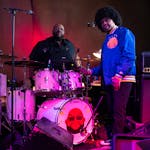After seeing the Who twice before — and not being all that amped up to hear the band's new material — Dan Israel didn't want to pay $100-$200 for decent seats to its upcoming show at Xcel Energy Center.
Then he saw an ad online for tickets on Groupon.
"I thought 'Why not?' when I saw the deal," said Israel of St. Louis Park, who's also a full-time musician, but not one making car-commercial money like the British rock legends. So he and his son Isaac snatched up lower-level seats for about $50 apiece, half the list price on Ticketmaster.
Long the domain of discount spa treatments, oil changes and trampoline parks, Groupon has become a big player in the concert industry.
Nearly half of Xcel Center's concerts this year have sold seats via the website and app, including recent appearances by Michael Bublé, New Kids on the Block and Weezer, and upcoming stops by Santana, Pentatonix and the oddball double bill of pop-punks Blink-182 and rapper Lil Wayne.
Groupon listed 129 concerts in the Twin Cities over the past year, also including shows at Target Center, the Armory, Myth and clubs such as the Varsity Theater and Cedar Cultural Center.
Discounts typically range from 20% to 50%. The catch is that fans usually don't know exactly where they'll sit until they get to the show.
Groupon's rise is the flip side of the airline-ticket pricing model now used by mega-promoter Live Nation, which owns Ticketmaster and is a Groupon partner.
For many of the Twin Cities' biggest concerts, Live Nation often holds back the best tickets as "platinum seats" to sell for twice the list price or more.
Conversely, less-sought-after seats — but not necessarily the worst — are offered via Groupon.
Live Nation, venue operators and band representatives like to offer Groupon discounts for shows they know won't sell out, since they can still make money on concessions, parking and T-shirt sales. (Live Nation owns many venues in other cities, and in Minneapolis it runs the Varsity and has a partnership with the Armory.)
Most music fans seem to like using Groupon, too.
"It was kind of a no-brainer," said Dave Comier of Minneapolis, who first used Groupon to score half-price tickets to Arcade Fire at Target Center five years ago. "I had wanted to go to the show anyway, but it was their first arena concert, and prices were a little bit higher than I like to pay. I imagine they weren't selling very well."
Promoters call the shots
Groupon used to be viewed by the concert industry as a last-ditch effort to boost poor-selling shows. However, the company now frequently offers deals on the day tickets go on sale, as was the case last week with the Blink/Wayne twofer ($54 seats cost $30).
"We now have the flexibility to be involved in the entire cycle of an event," said Brian Fields, vice president of the Things to Do department at Groupon, based in Chicago.
Groupon has become part of the long-term hype behind a concert.
Between its long-established daily-deal e-mail alerts, its heavily used mobile app and its claim of having 30 million active U.S. customers, Groupon is a shrewd way for promoters to reach customers who don't religiously follow concert announcements on radio stations or music websites.
"Ask the average person to name two concerts in their city over the next month, and most of them will have a hard time doing it," Fields said. "The discovery aspect Groupon offers is really powerful."
Groupon concert deals are almost entirely controlled by the promoters behind the shows, such as Live Nation. They decide when a deal is offered, for how much, how often and for which seats.
Local Live Nation representatives declined to comment on those particulars. Xcel Center officials deferred to them but said they are happy to accommodate deals whenever they are offered.
"Groupon is another marketing tool in the promoter's toolbox," said Jack Larson, vice president and general manager of the St. Paul arena. "We're always open for any opportunity that will help us sell tickets."
Not all concert promoters and fans are sold on Groupon, though.
First Avenue, a competitor of Live Nation that also operates the Palace and Fitzgerald theaters, does not use it for any of its gigs.
Concert vet Randy Levy of Rose Presents, which co-promotes the Soundset hip-hop festival, said his team only sold "a couple hundred" tickets via Groupon when they offered a modest discount on last month's festival, which drew more than 25,000 people.
"It was OK," Levy said, expressing deeper concern about StubHub and other resale ticket sites. "At least Groupon doesn't scalp. Personally, I prefer fans just buy from the authorized outlet, Ticketmaster or eTix or wherever. That way they will be getting a real ticket at face value."
Groupon does guarantee entry into the concert, but for seated shows it does not name the section or row numbers for your ticket — usually just the general area is listed, such as upper, lower or club level.
"I don't do Groupon for tickets because you don't know where you're sitting," complained Sara Savoy, a regular concertgoer in Minneapolis.
Most in the concert business see Groupon as a welcome alternative, though.
"People love it," said Justin Bailey, who works in the box office at Myth nightclub in Maplewood. "More often than not it's a win-win."
Chris Riemenschneider • 612-673-4658 Twitter: @ChrisRstrib






